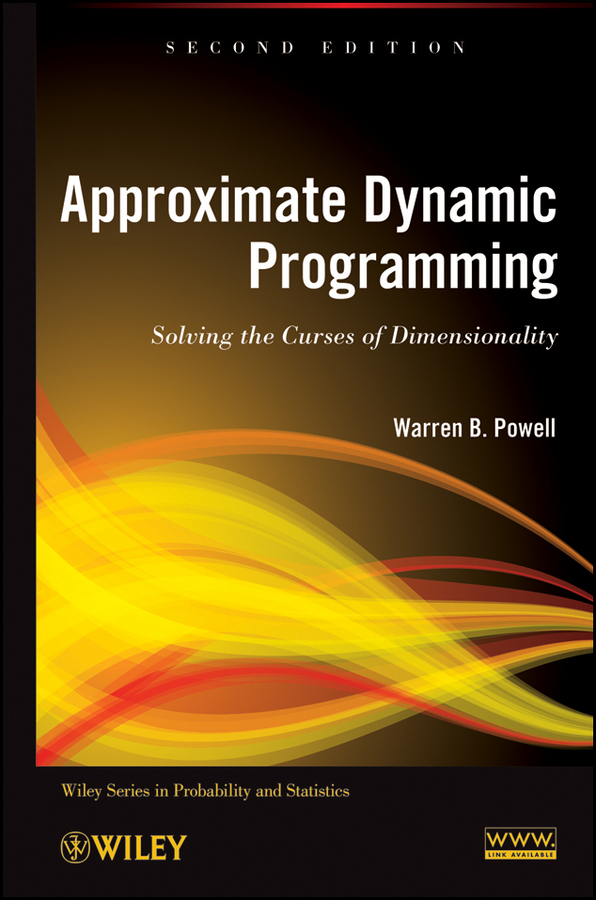Электронная книга: Warren Powell B. «Approximate Dynamic Programming. Solving the Curses of Dimensionality»

|
Praise for the First Edition«Finally, a book devoted to dynamic programming and written using the language of operations research (OR)! This beautiful book fills a gap in the libraries of OR specialists and practitioners.» —Computing Reviews This new edition showcases a focus on modeling and computation for complex classesof approximate dynamic programming problems Understanding approximate dynamic programming (ADP) is vital in order to develop practical and high-quality solutions to complex industrial problems, particularly when those problems involve making decisions in the presence of uncertainty. Approximate Dynamic Programming, Second Edition uniquely integrates four distinct disciplines—Markov decision processes, mathematical programming, simulation, and statistics—to demonstrate how to successfully approach, model, and solve a wide range of real-life problems using ADP. The book continues to bridgethe gap between computer science, simulation, and operations research and now adopts the notation and vocabulary of reinforcement learning as well as stochastic search and simulation optimization. The author outlines the essential algorithms that serve as a starting point in the design of practicalsolutions for real problems. The three curses of dimensionality that impact complex problems are introduced and detailed coverage of implementation challenges is provided. The Second Edition also features: A new chapter describing four fundamental classes of policies for working with diverse stochastic optimization problems: myopic policies, look-ahead policies, policy function approximations, and policies based on value function approximations A new chapter on policy search that brings together stochastic search and simulation optimization concepts and introduces a new class of optimal learning strategies Updated coverage of the exploration exploitation problem in ADP, now including a recently developed method for doing active learning in the presence of a physical state, using the concept of the knowledge gradient A new sequence of chapters describing statistical methods for approximating value functions, estimating the value of a fixed policy, and value function approximation while searching for optimal policies The presented coverage of ADP emphasizes models and algorithms, focusing on related applications and computation while also discussing the theoretical side of the topicthat explores proofs of convergence and rate of convergence. A related website features an ongoing discussion of the evolving fields of approximation dynamic programming and reinforcement learning, along with additional readings, software, and datasets. Requiring only a basic understanding of statistics and probability, Approximate Dynamic Programming, Second Edition is an excellent book for industrial engineering and operations research courses at the upper-undergraduate and graduate levels. It also serves as a valuable reference for researchers and professionals who utilize dynamic programming, stochastic programming, and control theory to solve problems in their everyday work. Издательство: "John Wiley&Sons Limited"
ISBN: 9781118029152 электронная книга Купить за 11316.87 руб и скачать на Litres |
Другие книги схожей тематики:
| Автор | Книга | Описание | Год | Цена | Тип книги |
|---|
См. также в других словарях:
Curse of dimensionality — The curse of dimensionality refers to various phenomena that arise when analyzing and organizing high dimensional spaces (often with hundreds or thousands of dimensions) that do not occur in low dimensional settings such as the physical space… … Wikipedia
Multi-armed bandit — A multi armed bandit is like a slot machine with multiple levers. In statistics, particularly in the design of sequential experiments, a multi armed bandit takes its name from a traditional slot machine (one armed bandit). Multiple levers are… … Wikipedia
Maldición de la dimensión — En matemáticas y estadística, la maldición de la dimensión (también conocida como efecto Hughes[1] ) es el problema causado por el crecimiento exponencial del volumen asociado al incremento del número de dimensiones en un espacio matemático. El… … Wikipedia Español
